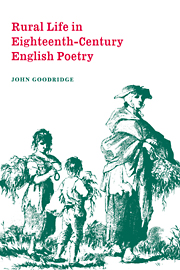Book contents
- Frontmatter
- Contents
- Preface
- Abbreviations, conventions, textual note
- Introduction
- Part I ‘Hard labour we most chearfully pursue’: three poets on rural work
- Part II ‘A pastoral convention and a ruminative mind’: agricultural prescription in The Fleece, I
- Appendix A ‘Siluria’
- Appendix B Eighteenth-century sheep breeds
- Notes
- Select bibliography
- Index
- CAMBRIDGE STUDIES IN EIGHTEENTH-CENTURY ENGLSH LITERATURE AND THOUGHT
Appendix A - ‘Siluria’
Published online by Cambridge University Press: 30 October 2009
- Frontmatter
- Contents
- Preface
- Abbreviations, conventions, textual note
- Introduction
- Part I ‘Hard labour we most chearfully pursue’: three poets on rural work
- Part II ‘A pastoral convention and a ruminative mind’: agricultural prescription in The Fleece, I
- Appendix A ‘Siluria’
- Appendix B Eighteenth-century sheep breeds
- Notes
- Select bibliography
- Index
- CAMBRIDGE STUDIES IN EIGHTEENTH-CENTURY ENGLSH LITERATURE AND THOUGHT
Summary
‘Siluria’ is glossed by Dyer (The Fleece, I, line 57, n) as ‘the part of England which lies west of the Severn, viz. Herefordshire, Monmouthshire, etc’; whereas Camden had included in his Siluria ‘Herefordshire, Radnorshire, Brecknockshire, Monmouthshire and Glamorganshire’. Clearly the concept is a flexible one, but Dyer's Siluria seems to be trans-Severn England, and in particular, Herefordshire. In a useful short essay on the subject (in The Dark Side of the Landscape, p. 173 n. 99) John Barrell traces the significance of Siluria as a ‘pastoral-georgic haven in a newly industrialised Britain’, through the poetry of John Philips, William Diaper, Pope and Dyer, and even in the prose of John Duncumb, in the Board of Agriculture report on Herefordshire (1805). We can find the roots of the ‘Silurian’ ideal in Drayton (Song VII), Camden (p. 574) and in the writings of early travel writers like Celia Fiennes (1696), and Daniel Defoe (1724–6, vol. II, p. 448).
As this might suggest, we can trace the idea of Siluria through what we may tentatively characterise as a distinctly ‘Silurian’ literature. Some of its key texts have been identifed above. Such a tradition might perhaps look back to William Langland's Piers the Plowman, whose central matter begins ‘on a morning in May, among the Malvern Hills’. It would certainly include the work of the seventeenth-century poets Thomas Traherne (born in Hereford), and Henry Vaughan (born in Brecknock) who styled himself ‘The Silurist’, and John Milton's Comus (1637), composed for a Silurian setting (Ludlow), and appropriately stocked with Silurian imagery.
- Type
- Chapter
- Information
- Rural Life in Eighteenth-Century English Poetry , pp. 181 - 182Publisher: Cambridge University PressPrint publication year: 1996

